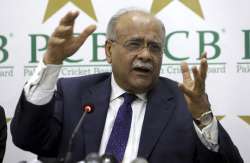Asia Cup: We will not accept any other schedule except proposed hybrid model - PCB chief Najam Sethi
The PCB chairman said 80 percent of the revenues earned by the Asian Cricket Council came from Pakistan and India matches.

Pakistan Cricket Board (PCB) chairman Najam Sethi has expressed that it may lose around USD 3 million if the country refuses to play in the Asia Cup this year. He further said that the country will only play the tournament if it is played using the hybrid model that they have suggested.
Sethi said that Pakistan was willing to bear this loss of revenue as it was "a matter of principle" as far as the hosting rights of the Asia Cup are concerned.
"We have made it very clear that unless the Asia Cup is held on a hybrid model as we have proposed, that is India playing its matches at an offshore venue and Pakistan hosting the remaining games at home we will not accept any other schedule and neither play," he said.
The Asia Cup was scheduled in September this year but BCCI secretary Jay Shah, who is also the ACC chairman, announced in October 2022 that India will not travel to Pakistan. In the first formal meeting between BCCI secretary Jay Shah and PCB chairman Najam Sethi held in Bahrain on February 4, the discussion regarding the venue of Asia Cup 2023 took place but the final decision was withheld
Sethi has proposed a "hybrid model" to host the Asia Cup where India will play its matches at an offshore venue.
"We will not lose our hosting rights. Security is no excuse for them now and we have told them if their government is not giving them clearance to play in Pakistan show us some written proof of this," Sethi said.
"When all other teams including Australia, England, and New Zealand are playing in Pakistan without any issues there should be no security concerns for India to tour Pakistan."
The PCB chairman said 80 percent of the revenues earned by the Asian Cricket Council came from Pakistan and India matches.
Asked about a possible refusal by Pakistan to play in the World Cup, Sethi said relations with ICC were different and in such a scenario the relations could be affected negatively.
(Inputs from PTI)